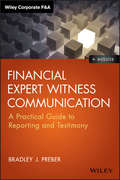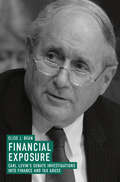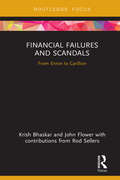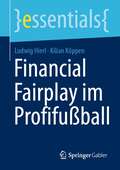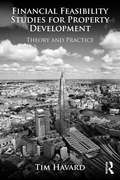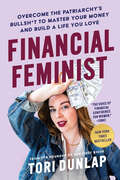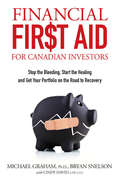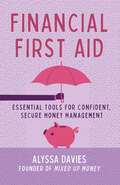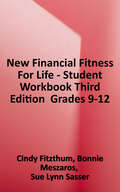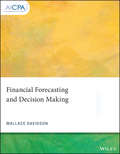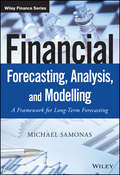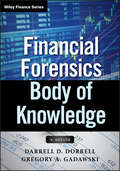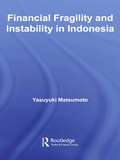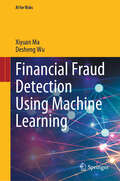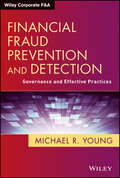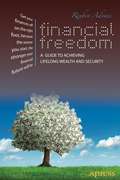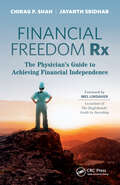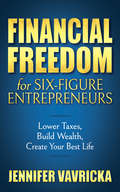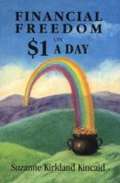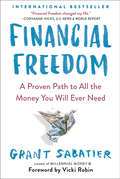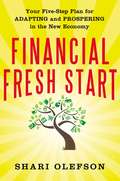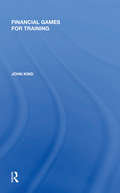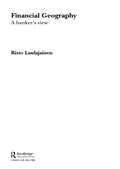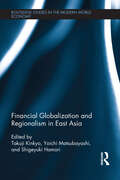- Table View
- List View
Financial Expert Witness Communication: A Practical Guide to Reporting and Testimony (Wiley Corporate F&A)
by Bradley J. PreberLearn what to expect—and what's expected—as an expert witness Serving as a financial expert witness or consultant in lawsuits is a stressful, challenging, and tough business. In Financial Expert Witness Communication: A Practical Guide to Reporting and Testimony, financial forensic expert Bradley J. Preber leverages more than 30 years of experience to create a practical guide for financial expert witnesses as they face litigation reporting and testimony. Financial Expert Witness Communication covers all areas of financial litigation including accounting, financial forensics, forensic technology, and damages—all from the point of view of an expert witness. The book is especially helpful for those who expect to be formally designated as an expert witness; however, it is also appropriate for financial forensic accountants, litigation consultants, and attorneys as they navigate the unique playing field of the financial litigation process. This book gives financial experts strategies to defend the analysis, conclusions, and expert opinions they have at their disposal. It also provides thorough explanations of compliance, data limitations, and due diligence as well as how to handle demanding legal counsel, with a goal of better preparing them for the entire legal process. The book is part of the Wiley Corporate F&A Series and was created as an educational resource for nonattorney financial experts involved with U.S.-based civil litigation or alternative dispute resolution proceedings. It takes a well-rounded approach by including special chapters on such concepts as retention, privilege, responsibilities, ethics, and testimony, all written by a nationally recognized expert. As a bonus, the companion website presents an additional expert witness case study and guidelines for fulfilling an expert witness role.
Financial Exposure: Carl Levin's Senate Investigations Into Finance And Tax Abuse
by Elise J. BeanAt a time when Congressional investigations have taken on added importance and urgency in American politics, this book offers readers a rare, insider’s portrait of the world of US Congressional oversight. It examines specific oversight investigations into multiple financial and offshore tax scandals over fifteen years, from 1999 to 2014, when Senator Levin served in a leadership role on the US Senate Permanent Subcommittee on Investigations (PSI), the Senate’s premier investigative body. Despite mounting levels of partisanship, dysfunction, and cynicism swirling through Congress during those years, this book describes how Congressional oversight investigations can be a powerful tool for uncovering facts, building bipartisan consensus, and fostering change, offering detailed case histories as proof. Grounded in fact, and written as only an insider could tell it, this book will be of interest to financial and tax practitioners, policymakers, academics, students, and the general public.
Financial Failures and Scandals: From Enron to Carillion (Disruptions in Financial Reporting and Auditing)
by John Flower Krish BhaskarThis concise volume evaluates the cause and significance of recent corporate failures and financial scandals, and how they reflect on the fitness for purpose of the external auditors, financial reports, financial watchdogs, boards, directors and senior management. Failures like the disastrous collapse of Carillion, examined at length, have ultimately led to a crisis of confidence not only in the audit process but in the entire process of financial reporting. Revealing the shortcomings in audit quality, independence, choice and the growing expectation gap, Financial Failures and Scandals questions if the profession, its regulators or government watchdogs, are adequately prepared for the challenges of increasing regulation, public outcry and political scrutiny in the face of inevitable future financial failures. The fundamental structures of financial reporting, annual reports, boards of directors and senior management are often found to have failed. Tighter regulation and new requirements for reporting will inevitably result. Drawing on extensive research and interviews with insiders, users and experts, this unique book provides a compelling account of the profoundly disruptive impact of financial failures on corporate and financial accountability. Topical and readable, this book will be of great interest to students, researchers and professionals in accounting and auditing, as well as to policy makers and regulators.
Financial Fairplay im Profifußball (essentials)
by Ludwig Hierl Kilian KöppenIm Rahmen dieses essentials werden zunächst die Financial Fairplay-Regularien der UEFA in ihrer Ausgestaltung und Anwendung dargestellt. Mängel sind nicht erst seit den Sportgerichtshof-Urteilen gegen beziehungsweise für Manchester City und Paris Saint Germain offensichtlich. Von einer Überarbeitung bis hin zur Abschaffung werden zahlreiche Optionen zur Reformierung diskutiert, auch auf Seiten der UEFA, wobei viele Ansätze wie beispielsweise die Deckelung von Spielergehältern („Salary Caps“) oder Ablösesummen keinesfalls neu sind. Neu ist allerdings, dass sich die Einschätzung, ob hiermit gegen europäisches Recht verstoßen werden würde, verändert hat.
Financial Feasibility Studies for Property Development: Theory and Practice
by Tim HavardEssential for any real estate professional or student performing feasibility studies for property development using Microsoft Excel and two of the most commonly used proprietary software systems, Argus Developer and Estate Master DF.This is the first book to not only review the place of financial feasibility studies in the property development process, but to examine both the theory and mechanics of feasibility studies through the construction of user friendly examples using these software systems. The development process has seen considerable changes in practice in recent years as developers and advisors have adopted modern spread sheets and software models to carry out feasibility studies and appraisals. This has greatly extended their ability to model more complex developments and more sophisticated funding arrangements, saving time and improving accuracy.Tim Havard brings over 25 years of industry and software experience to guide students and practitioners through the theory of development appraisals and feasibility studies before providing internationally applicable worked examples and potential pitfalls using Excel, Argus Developer and Estates Master DF.
Financial Feminist: Overcome the Patriarchy's Bullsh*t to Master Your Money and Build a Life You Love
by Tori DunlapFinancial Feminist has descriptive copy which is not yet available from the Publisher.
Financial First Aid for Canadian Investors: Stop the Bleeding, Start the Healing and Get Your Portfolio on the Road to Recovery
by Michael Graham Bryan Snelson Cindy DavidPraise for the previous edition, Portfolio First Aid "I'd categorize Portfolio First Aid as a serious investment primer that has the laudable, if ambitious, goal of raising the sophistication level of the general public." —Jonathan Chevreau, Financial Post "Portfolio First Aid has the right pedigree as an advice tome on healthy investing. Covers the bases of portfolio balance, building wealth, investing for income and managing risk." —The Edmonton Journal The financial meltdown has taken a severe toll on the finances of Canadians, and on their confidence in financial and investment advisors. Canadians need help to learn how to diagnose what is the greatest threat to their long-term financial well-being and to follow a course of treatment to recovery. Financial First Aid for Canadian Investors is for all the battered and bloodied investors whose portfolios are in tatters and who lack direction about what to do next. By examining the lessons to be learned from mistakes made in both good and bad markets, the authors address the common and recurring investment blunders they have witnessed over many years, and offer a clear prescription for how to repair wounded portfolios.
Financial First Aid: Essential Tools for Confident, Secure Money Management
by Alyssa DaviesA practical guide for handling life's financial emergencies for the cash-strapped, the meticulous budgeter, and everyone in between. What do a layoff, a medical emergency, a broken appliance, and a natural disaster have in common? Each scenario has the potential to upend your personal finances, no matter your financial situation. Money can be an intense source of stress, especially when you suddenly don't have enough of it. This handy and accessible reference from Alyssa Davies, founder of the popular finance blog Mixed Up Money, is here to help you navigate these financial ups and downs with a judgment-free approach. It offers actionable advice for different types of emergencies, short- and long-term solutions, resources, and tips from well-known financial experts who have been there before. You'll find scripts for negotiating payments for large bills, and learn how to revise a budget if you need to care for a loved one who is sick, recognize financial abuse, and much more. Charming illustrations by the author add a touch of humor to her expert advice. Best practices for building a robust emergency fund and road maps for recovering from a financial emergency will help you face your next rainy day.
Financial Fitness for Life Student Workbook, Grades 9-12
by Bonnie Meszaros Scott Bacon Gail Colbert Cindy Fitzthum Sue Lynn SasserThis book is a CEE publication that helps teachers prepare students for life beyond the classroom by presenting materials based on real-world concepts in a way that reinforces learning through practice. The lesson plans within this collection have a description of the lesson, slides, and/or activities with educational technology tools such as Kahoot! and/or Quizlet. For full access to the book, shop for the Teacher Guide and Student Workbook.
Financial Forecasting and Decision Making (AICPA)
by Wallace Davidson IIIMany companies fail to succeed due to poor planning, which is one reason why CPA's are in big demand. Skilled at forecasting, CPAs can plan a company's future by determining the maximum sustainable growth and predict its external fund requirements. This course provides you with the basic tools necessary to project the balance sheet and statements of income and cash flow, enabling you to add a unique value to your client(s) work.
Financial Forecasting, Analysis and Modelling
by Michael SamonasRisk analysis has become critical to modern financial planningFinancial Forecasting, Analysis and Modelling provides a complete framework of long-term financial forecasts in a practical and accessible way, helping finance professionals include uncertainty in their planning and budgeting process. With thorough coverage of financial statement simulation models and clear, concise implementation instruction, this book guides readers step-by-step through the entire projection plan development process. Readers learn the tools, techniques, and special considerations that increase accuracy and smooth the workflow, and develop a more robust analysis process that improves financial strategy. The companion website provides a complete operational model that can be customised to develop financial projections or a range of other key financial measures, giving readers an immediately-applicable tool to facilitate effective decision-making.In the aftermath of the recent financial crisis, the need for experienced financial modelling professionals has steadily increased as organisations rush to adjust to economic volatility and uncertainty. This book provides the deeper level of understanding needed to develop stronger financial planning, with techniques tailored to real-life situations.Develop long-term projection plans using ExcelUse appropriate models to develop a more proactive strategyApply risk and uncertainty projections more accuratelyMaster the Excel Scenario Manager, Sensitivity Analysis, Monte Carlo Simulation, and moreRisk plays a larger role in financial planning than ever before, and possible outcomes must be measured before decisions are made. Uncertainty has become a critical component in financial planning, and accuracy demands it be used appropriately. With special focus on uncertainty in modelling and planning, Financial Forecasting, Analysis and Modelling is a comprehensive guide to the mechanics of modern finance.
Financial Forensics Body of Knowledge
by Darrell D. Dorrell Gregory A. GadawskiThe definitive, must-have guide for the forensic accounting professional Financial Forensics Body of Knowledge is the unique, innovative, and definitive guide and technical reference work for the financial forensics and/or forensic accounting professional, including nearly 300 forensic tools, techniques, methods and methodologies apply to virtually all civil, criminal and dispute matters. Many of the tools have never before been published. It defines the profession: "The Art & Science of Investigating People & Money. " It defines Forensic Operators: ". . . financial forensics-capable personnel. . . possess unique and specific skills, knowledge, experience, education, training, and integrity to function in the financial forensics discipline. " It defines why: "If you understand financial forensics you understand fraud, but not vice versa" by applying financial forensics to all aspects of the financial community. It contains a book-within-a-book Companion Section for financial valuation and litigation specialists. It defines foundational financial forensics/forensic accounting methodologies: FAIM, Forensic Accounting Investigation Methodology, ICE/SCORE, CICO, APD, forensic lexicology, and others. It contains a Reader Lookup Table that permits everyone in the financial community to immediately focus on the pertinent issues.
Financial Fragility and Instability in Indonesia (Routledge Contemporary Southeast Asia Series #2)
by Yasuyuki MatsumotoThis highly relevant study provides an incisive analysis of a critical phase in recent East Asian financial history, exploring the underlying causes of the financial crisis that struck Indonesia during the second half of 1997. Matsumoto’s extensive commercial experience in Indonesian finance during these critical years, allows him to skilfully argue that the roots of the crisis lay in the period of capital liberalization undertaken during the boom years from 1994 to 1997 which encouraged the development of fragile and unstable financial structures, involving increased corporate leverage, reliance on external debt, and the introduction of riskier and more complicated financial instruments and transactions. In-depth fieldwork data and four detailed case studies illuminate the microeconomic foundations of the crisis, showing how Indonesian capitalists sought to liquidate their Indonesian assets without losing control of their corporate empires, by taking advantage of increased access to foreign loans and complex financial re-engineering, actions which ultimately precipitated instability and crisis throughout the entire financial system. Finally, it reflects upon the policy implications of this episode, putting forward the case for comprehensive capital controls for open and developing economies until they establish appropriate financial institutions to monitor and manage the level of indebtedness and the volatility of capitalists’ behaviour.
Financial Fraud Detection Using Machine Learning (AI for Risks)
by Desheng Wu Xiyuan MaThis book serves as a comprehensive guide to learning various aspects of financial fraud, encompassing the related research, the current situation, potential causes, implementation process, detection methods, regulatory penalties and management challenges in publicly listed companies. In this book, readers learn about the fraudulent practices that may occur in corporate operations, the executing mechanisms, an identifying indicators framework, and diverse detection methods including qualitative and quantitative models. Quantitative models include discriminant analysis, econometric analysis, and machine learning (ML) models. This book highlights the application of ML algorithms to detect financial fraud detection and discusses their limitations, such as high false-positive costs, delayed detection, the demand for interdisciplinary expertise, dependency on specific application scenarios, and issues with fraud data quality. Each related chapter provides a structured overview of the problems addressed, the algorithms used, experimental result and comparisons. Additionally, this book examines the cost-benefit trade-offs faced by companies engaging in financial fraud, considering factors such as ethical dilemmas, opportunities, practical needs, exposure risks, and litigation costs. This book is written for financial regulation institutions, business leaders, auditors, academics, and anyone interested in financial fraud detection. It offers practical insights into effectively preventing and controlling financial fraud and an overview of the latest advancements in ML technologies. Through real-world case studies, readers will gain a deeper understanding of the financial fraud, how ML can be used to detect it, as well as its pitfalls and limitations. Overall, this book bridges the gap between theory and application, equipping readers to understand how to detect financial fraud with the power of accounting and ML in the modern business environment.
Financial Fraud Prevention and Detection: Governance and Effective Practices (Wiley Corporate F&A)
by Michael R. YoungStep-by-step guidance for board members and executives on preventing and detecting accounting fraud In the wake of highly publicized allegations of accounting irregularities and fraudulent financial reporting that are shaking up today's corporate community, Financial Fraud Prevention and Detection provides a step-by-step guide to how these crises can envelop a company and how to prevent them from happening in the first place. It is written for almost everyone involved: outside directors, audit committee members, senior executives, CFOs, CPAs, in-house lawyers, and outside law firms. Provides a blueprint for Fraud Prevention and Detection for corporate executives Presents step-by-step guidance to corporate boards and C-suite executives on managing the threat of accounting fraud Prepares directors and executives for the possibility of accounting irregularities Answers the question of how accounting fraud starts—and grows With solid strategies for prevention of accounting fraud as well as a process to follow when fraud has been discovered, Financial Fraud Prevention and Detection vividly explores the corporate environment that causes fraud, how it spreads, the kind of crises it can create for a company, and the best ways to deal with it.
Financial Freedom
by Reuben AdvaniProblem-Solving and Selected Topics in Euclidean Geometry: ?in the Spirit of the Mathematical Olympiads'' contains theorems which are of particular value for the solution of geometrical problems. Emphasis is given in the discussion of a variety of methods, which play a significant role for the solution of problems in Euclidean Geometry. Before the complete solution of every problem, a key idea is presented so that the reader will be able to provide the solution. Applications of the basic geometrical methods which include analysis, synthesis, construction and proof are given. Selected problems which have been given in mathematical olympiads or proposed in short lists in IMO''s are discussed. In addition, a number of problems proposed by leading mathematicians in the subject are included here. The book also contains new problems with their solutions. The scope of the publication of the present book is to teach mathematical thinking through Geometry and to provide inspiration for both students and teachers to formulate ''positive'' conjectures and provide solutions.
Financial Freedom Rx: The Physician’s Guide to Achieving Financial Independence
by Chirag Shah Jayanth Sridhar"The best physician-specific general financial book published in 2021." —James M. Dahle, MD, author of The White Coat InvestorA step-by-step guidebook for doctors and other medical professionals about growing and preserving wealth, Financial Freedom Rx: The Physician’s Guide to Achieving Financial Independence gives physicians all the tools necessary to manage their own finances and includes a foreword by Mel Lindauer, co-author of The Bogleheads' Guide to Investing. Medical professionals, especially doctors, spend many years in training as they accumulate debt and delay their earnings. This book presents a time-tested formula that students and established professionals can follow at any stage during their careers to achieve fiscal peace of mind. Students will learn how to budget and adopt disciplined financial practices. Residents and other trainees will learn how to defend against calamity with various insurances and how to manage debt. Junior professionals will acquire the skills needed to invest and grow their portfolios, while senior professionals will better understand the essentials of estate planning and retirement. Drs. Chirag P. Shah and Jayanth Sridhar wrote this inspiring text to guide physicians where to put their next dollar. This is particularly important during the financial uncertainties brought on by COVID-19 and insurance cuts. Financial Freedom Rx sets forth principles that will pilot medical professionals toward financial independence. Chapters include useful advice on topics such as: Financial planning Investing and asset allocation Jobs and contracts Taxes and insurance Student loans and debt Retirement savings and distributions Financial Freedom Rx: The Physician’s Guide to Achieving Financial Independence serves as a timeless blueprint for financial planning that medical professionals will follow throughout their careers, and as a reference that readers will revisit again and again as they progress through the various stages of life.
Financial Freedom for Six-Figure Entrepreneurs: Lower Taxes, Build Wealth, Create Your Best Life
by Jennifer VavrickaBuild a life of wealth, freedom, and retirement security with these lessons from a successful entrepreneur and finance expert.You are focused, talented, and hardworking—and now you’re reaping the rewards of a six-figure income. Yet it seems that the more money you make, the more you pay. So how can you ever truly get ahead? Wealth expert Jennifer Vavricka has encountered this dilemma countless times, and she has the solutions you’re searching for.In Financial Freedom for Six-Figure Entrepreneurs, Vavricka shares a proven system that helps entrepreneurs build wealth, reduce taxes, and plan for retirement while living the lifestyle they desire now. She shows you just how easy it is to:• Begin increasing your net worth right now• Know exactly the rate your money is growing—with 100% accuracy• Choose the right way to reduce your taxes, and why this matters• Build wealth that provides real financial freedom• Avoid the most common mistakes people make with their money and much more!
Financial Freedom on $1 a Day
by Suzanne Kirkland KincaidA financial guide useful for Parents, Senior Citizens, College Students, Educational Support Systems, Independent Politicians, Network Marketers, Small Business Owners and Charities/Non Profits.
Financial Freedom: A Proven Path to All the Money You Will Ever Need
by Vicki Robin Grant SabatierMoney is unlimited. Time is not. Become financially independent as fast as possible.In 2010, 24-year old Grant Sabatier woke up to find he had $2.26 in his bank account. Five years later, he had a net worth of over $1.25 million, and CNBC began calling him "the Millennial Millionaire." By age 30, he had reached financial independence. Along the way he uncovered that most of the accepted wisdom about money, work, and retirement is either incorrect, incomplete, or so old-school it's obsolete.Financial Freedom is a step-by-step path to make more money in less time, so you have more time for the things you love. It challenges the accepted narrative of spending decades working a traditional 9 to 5 job, pinching pennies, and finally earning the right to retirement at age 65, and instead offers readers an alternative: forget everything you've ever learned about money so that you can actually live the life you want.Sabatier offers surprising, counter-intuitive advice on topics such as how to:* Create profitable side hustles that you can turn into passive income streams or full-time businesses* Save money without giving up what makes you happy* Negotiate more out of your employer than you thought possible* Travel the world for less* Live for free--or better yet, make money on your living situation* Create a simple, money-making portfolio that only needs minor adjustments* Think creatively--there are so many ways to make money, but we don't see them.But most importantly, Sabatier highlights that, while one's ability to make money is limitless, one's time is not. There's also a limit to how much you can save, but not to how much money you can make. No one should spend precious years working at a job they dislike or worrying about how to make ends meet. Perhaps the biggest surprise: You need less money to "retire" at age 30 than you do at age 65.Financial Freedom is not merely a laundry list of advice to follow to get rich quick--it's a practical roadmap to living life on one's own terms, as soon as possible.
Financial Fresh Start: Your Five-Step Plan for Adapting and Prospering in the New Economy
by Shari OlefsonFrom depleted retirement accounts to underwater homes, its been gloomy news for years. But the picture will get much brighter for those who take advantage of the laws and reforms enacted in the wake of the banking, real estate, and economic meltdown. The Dodd-Frank Act. The Making Home Affordable Program. The Consumer Financial Protection Bureau. These are just a few examples of the significant but little-understood changes that offer people an unprecedented chance to set things right with their credit, savings and investments, employment, housing, retirement and more. Financial Fresh Start explains it all simplifying the complicated reforms and motivating readers to shake off their malaise and radically improve their long-term financial prospects. Written by a dynamic author with a unique blend of legal, financial, and real estate expertise, the books big-picture lens spans the spectrum of money matters, and delivers clear, actionable answers to questions such as: How can you repair your credit quickly and avoid high finance costs? What are the safest places for saving and investing? Can you legally avoid repaying what you owe? Will your home ever be worth what you paid for it? Is there life after foreclosure? Are you missing out on programs that can put money in your pockets? Is it possible to make up for recent losses and still retire on time? And more Big corporations and the mega-wealthy have professionals to keep them abreast of the latest regulations. Now, everyday people can learn what the new rules really mean to them with the expert guidance and practical solutions in Financial Fresh Start.
Financial Games for Training
by John KindAccounting and finance have a reputation for complexity and dullness. Financial Games for Training aims to change these perceptions! It is an original collection of more than 65 brainteasers, crosswords, puzzles and quizzes plus all the solutions. They've been specially designed to bring a light-hearted but rigorous approach to the study and teaching of an otherwise 'boring' subject. Whether you're a student or executive, participant or tutor, here's the treasure chest you need to improve your grasp of finance for business. You won't think about the subject in quite the same way ever again!
Financial Geography: A Banker's View (Routledge International Studies In Money And Banking Ser. #Vol. 25)
by Risto LaulajainenThis truly internationally-focused book is a readable, comprehensive guide to the economic geography of the world's financial centres that is as enjoyable to read as it is informative. All students and academics involved with economic geography as well as professionals in the banking and finance industries will find Financial Geography to be an ind
Financial Globalization and Regionalism in East Asia: Financial Globalization And Regionalism In East Asia (Routledge Studies in the Modern World Economy)
by Shigeyuki Hamori Takuji Kinkyo Yoichi MatsubayashiWith increased resilience in the financial systems, emerging Asian economies were less affected by the recent global financial crisis, recovering more quickly from the crisis than major advanced economies. Yet, Asian financial systems remain underdeveloped. More open and efficient financial systems continue to be a key priority for Asia’s development strategy. Emerging Asian economies need to tackle the new challenges to macroeconomic and financial stability posed by financial globalisation. This book identifies the key challenges to Asia’s financial development in an era of rapid financial globalisation and discusses their policy implications for financial reforms and regional cooperation in East Asia. Particular areas of focus include: the impact of financial globalisation on economic stability and inequality in East Asian economies; the progress of Asia’s regional financial cooperation and lessons from the recent European economic crisis; and the priority of financial reforms in individual Asian economies. Combining advanced econometric methods and in-depth case studies, this book provides rigorous and contextual analyses of the most critical issues for Asia’s financial development. It offers a comprehensive and useful guide for students, academics, and policymakers interested in the current state and future prospects of Asian financial systems.
